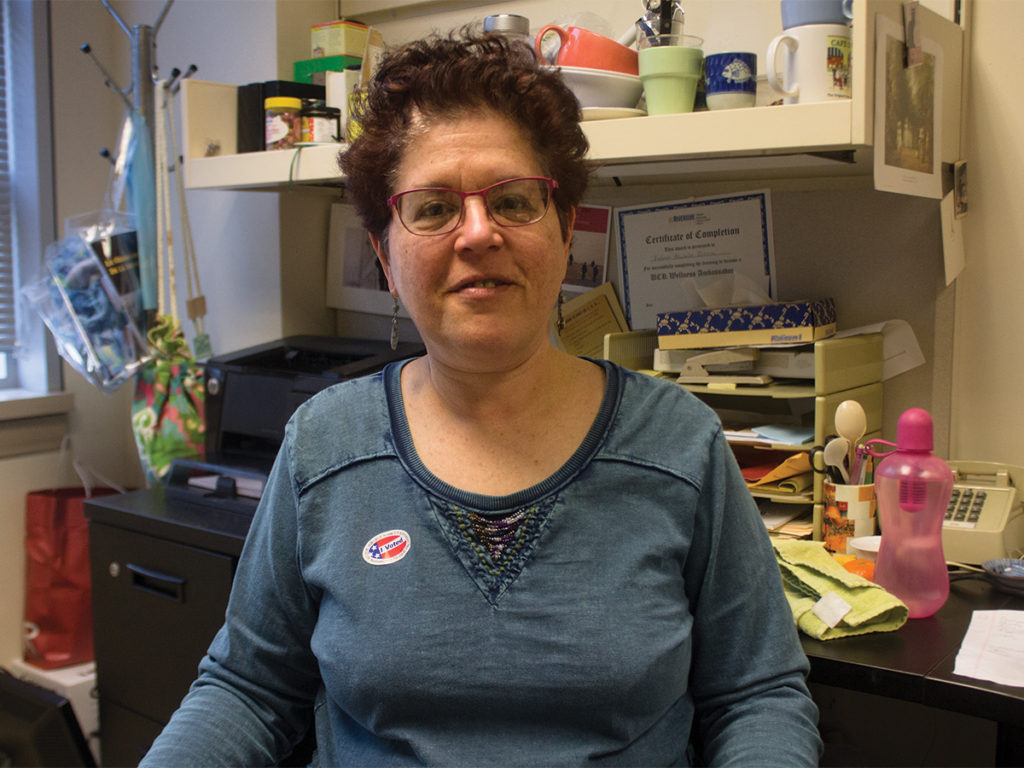
Since 1997, UC Riverside Professor of Comparative Literature and French Michelle Bloom, Ph. D, has selflessly lent her lifelong experience travelling the world, particularly France, while ardently studying literature and cinema through a comparative lense. Being mindful of the cultural differences that can be oversimplified when not researched extensively enough, she has heedlessly taught her students while exemplifying in her own work the need to be well-informed and to focus on one’s line of expertise. For instance, her first book, “Waxworks: A Cultural Obsession,” examines wax figures in the context of cinema and pop culture, and she is known for offering numerous courses on food in its relation to film. Aside from being an intriguing, versatile professor, she is also known on campus for being a Wellness Ambassador as well as an LGBT ally.
As part of our “Word of Advice” series, we sat down with Bloom to obtain the inside details on her lifelong dedication toward cinema, art, travel, teaching and research as well as advice she would like to give to students currently chasing their dreams within cinema or carrying out another form of art or film production and studies.
The discussion has been lightly edited for clarity.
Jasmine: How did you first become interested in French cinema and what helped you cultivate your studies within this area?
Prof. Bloom: I actually became interested in France and French literature before I got into cinema. It had to be motivated in part because my mother was born in Paris and raised in France. I started to learn French in junior high school. I started with comparative literature in college, kept going with my French and got to film through literature. That’s when I started to write my dissertation. I became interested in both wax figures and Hollywood films.
Jasmine: So you didn’t exactly start your studies with French film but Hollywood films per se?
Prof. Bloom: Well, I would just say “film” in general. Specifically in the context of my dissertation, it was Hollywood film and then I started looking at French literature. So I would say I am interested in all types of film but particularly with an interest in France. Also spending time in France and Paris and Lyon (the quote-unquote birthplace of cinema) got me interested in film. France has such a film culture, not only of its own but of those around the world. So I teach about French films and world films as well.
Jasmine: Would you say that in order to become truly passionate about something, you have to visit the place that it is geographically connected to first?
Prof. Bloom: I think it’s great if you do but I think things can go in different directions. I know a lot of students who are passionate about France but have never been there. I have years of learning French from about age 12 to 18 or 19, when I first went, so it kind of feeds off passion, wanting to go, then being there creates more passion.
Jasmine: Do you think pursuing an interest in French film or perhaps film in general would be difficult if you didn’t have support from professors, peers, mentors in general, etc.?
Prof. Bloom: I think one of the crucial times in my studies was in grad school when I got a grant from the French government and it was really hard because French bureaucracy was difficult to navigate through (…) it seemed very disorganized and I didn’t get confirmation until soon before I had to leave. But that was a big deal to get and I had been there before and earlier on, between undergrad and grad school, I raised money through temporary work and just took off to France. So that was very difficult rather than raising money in an academic context. So it was difficult not having money or people who know the country to help.
Jasmine: Have you ever encountered any difficulties in gathering information from different cultures and combining them into concentrated studies? Or about learning about different cultures in general?
Prof. Bloom: When I first started to work on Asian cinema — looking at connections between Asian and French film — in 2006, I first went to mainland China (and) I realized I can’t talk about mainland Chinese film and Japanese film together; I can’t talk about Asian film for a research project because it’s huge. From setting foot in mainland China, it’s so different from Japan, economically, socioeconomically, etc. So that was one area in which you can go too broad in and so I narrowed it down and started looking at mainland China and Taiwan. It also depends on the context. When I teach, I teach world cinema classes sometimes — like the course on food in world food — and there it works because it’s not quite the same as publishing research so I can use my expertise in film. As a comparatist, we are used to working broadly sometimes as opposed to classical comparative literature — Germany and France — but you can look more broadly and you have the skills to do that. So I’ve taught a class session or two on Korean film and it’s on food because that’s where my expertise is — on film and on food. I can talk to people, read to get more informed on the culture. Certainly issues come up in which certain phenomenon in cultures, there is cultural difference — whether in time period or in culture. So things don’t mean the same thing in one culture, but to me that’s the interest in comparative literature.
Jasmine: So to summarize, in order to avoid sensitive areas within different cultures, it’s best to be informed about a specific area of research first?
Prof. Bloom: That’s true. When you discuss food in a specific culture, the area of expertise is also film. So once you have the skill to work in film studies, there’s still going to be people who are more experts, but you can also use those skills and tools and social work. There is cultural specificity so it depends on the context. Is it a class? Can you read about it? Is it a publication? What is the focus? So you can look across cultures and even to ones you’re not an expert in, but maybe in your publication you’ll look into the areas of your expertise.
Jasmine: Have you ever encountered any sensitive areas in film relating to cultural stigmas?
Prof. Bloom: I’m thinking about some things we have encountered in film class such as the portrayal of sexuality in France versus Hollywood in the U.S. or even China, etc. It’s interesting because if you think of Iranian film, a lot of them are about children because politically, they have to show things indirectly (…) in countries where there is censorship where the government won’t let people speak up freely. In China, which I talk about in my book, some filmmakers are banned and have to leave their country for several years and that’s part of why some of them have made work in say, France. That’s not necessarily about sex at all; it could be about political critique about their government. There’s a author and director named Dai Sijie from the Szechuan Province (…) he wrote a best-selling book called, “Balzac and the Little Chinese Seamstress,” which was written in French and made into a film, translated in over 30 languages (…) so there were a lot of issues that were about the cultural revolution. Of course, in France it was fine, but he was having a lot issues getting permission to shoot in China and he had to change the end of the novel to suit the Chinese.
Sometimes it’s hard to avoid everything disturbing … it can be worth to watch to be provided with more context into the film and why things make the impressions on viewers that they do.
Jasmine: How should you study French cinema?
Prof. Bloom: I’m very interested in films as texts and sound and image and yet you can’t really take it out of the context it was made. When we look at a film, it’s important to know in what context it was appearing in.
Jasmine: Have you ever encountered difficulties writing about topics in film that might be controversial or triggering, such as sexuality or violence?
Prof. Bloom: Perhaps this is naive, but I tend to experience this differently in the classroom than in the publication. Sometimes in the publication in which various people are going to be reading it, it is important to be mindful and sensitive toward who will be reading it and how it will be received. So that is one issue, but in the classroom, I feel like I need to be more aware of how students will react and what they may be sensitive to. At the same time, I feel strongly that we are in a classroom situation; (when) studying film, (we) are going to push the limit of our comfort, so I think one needs to balance between that. You don’t want to go overboard but there is so much that can be triggering in film. In class, there are screenings and I am asking you to watch films, thus the need to give trigger warnings so that people at least know what to expect. Whereas if I publish something, it’s less likely that something I will write will trigger people. Maybe the film will, but at least by writing about it, people can decide if they want to watch it or not.
Jasmine: Are you saying that it’s almost beneficial to be exposed to things that we might be kind of sensitive toward or might emotionally negatively affect us?
Prof. Bloom: It’s a loaded thing to say that it’s beneficial to be hurt, but in a way, I think it can be beneficial. People have individual tolerances and limits to what we can take. I don’t know if people should be exposed for the sake of exposure but when there are objectionable scenes or images that are in cinema that are important to film history, one should look at it and consider it and critically. Sometimes it’s hard to avoid everything disturbing so if we can look at things critically and ask why something is disturbing, it can be worth to watch to be provided with more context into the film and why things make the impressions on viewers that they do.
Jasmine: Beyond stigmas within film itself, have you ever experienced discrimination when studying film? Perhaps someone wasn’t very supportive of your studies because they found out it was about film?
Prof. Bloom: Perception toward film studies have changed over time. When I first taught at UCR in 1997 and coming into this department of comparative literature, I was told point blank: “Don’t write too much about film in your publications and make sure you have a lot of literature,” because it would be frowned upon to include too much about film. I offered French 45 the first time in 1997, three students enrolled and it was cancelled. UCR was not at the forefront because there were other film programs at the time but it was relatively new here. But things have changed over time.
Jasmine: Why do you think this stigma toward film existed?
Prof. Bloom: At the time, I don’t think film was treated as an art. It wasn’t treated seriously and we’ve also moved in a way toward to it being accepted to work on in popular culture. On one hand we’ve moved toward art house film but on another we’ve realized it’s okay to study pop culture and B-films and mainstream film. I think the study of food may be something similar and graphic novels or comics. I know there are some places where those two aren’t seen as legitimate but (with) a lot of these kinds of new areas of studies, people will not take them seriously and people will think it’s “just for fun.”
Jasmine: What do you think has helped the study of film expand more at UCR?
Prof. Bloom: Probably just bringing in more people and the media and cultural studies major that used to be film and visual culture. It used to be a program I believe but now it’s a department. I think part of it always has to do with moving with the times and people use film all the time in classes. In fact, we get to the point in class when we’re considering if we’re done with film and moving on to digital technologies, so we move along with the times.
Jasmine: What about UCR has made you stay as a professor for the past 20 years?
Prof. Bloom: I love UCR and I like the students here. I feel like the fact that we have such a diverse student body — people from different backgrounds — brings so much to the campus, to the community. I really enjoy the students. I enjoy my colleagues. There’s something special about this community and really the student body here that’s very different than the elitist, private institutions that my own training comes from. I think there’s something more that students can offer here and that I can give to them. Even though the student population has grown by leaps and bounds — I think the student body was 9,000 when I got here — at UCR, despite growing class sizes, there is a feeling of it not being huge. I like the contact with students and that they can come and see me and talk to me. I like teaching in the classroom and the one-on-one and getting to know students. And I find that when I do I am blown away by the students here. I owe the work that I’m doing to UCR. It has really inspired me and shaped my work on Sino-French relations, interest in food studies, French connections to Japanese culture. That’s why I’m here: The demographics (and) student interest both on the undergraduate and graduate level.








